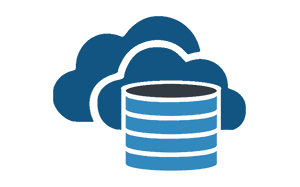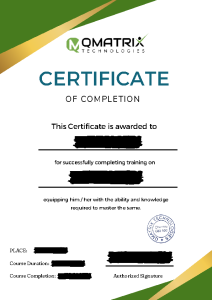Are you trying to get the top training for Cloud Computing in Chennai?
Get instruction on all the major cloud products, including AWS, MSAzure, VMWare, Salesforce, and Google Cloud, with Qmatrix Technologies, the top Cloud Computing Training Institute in Chennai. They offer practical, project-oriented training.













Modules for the Cloud Computing course have been expertly created to satisfy industry standards worldwide.
Course materials are hand-picked by professionals in the field to help learners grasp cloud architecture, services, hosting, and deployment.
Knowledgeable trainers in Cloud Computing with over 9+ years of platform expertise.
Complete Cloud Computing Training to help you understand the principles of cloud computing.
Interactive Cloud Computing Training session at Qmatrix Technologies in Chennai, led by an interactive educator.
Frequent review sessions covering prior classes are offered to enhance your proficiency.
Cloud Computing Training in Chennai is offered by Qmatrix Technologies in smart classrooms that use blended learning.
Professional Cloud Computing Training is available at a reasonable price, and following course completion, certification is granted.
Weekend and Weekday Cloud Computing Training in Chennai is available at Qmatrix Technologies with flexible batch timing.
Once qualified students have completed the training, Qmatrix Technologies offers 100% placement support.
We have partnerships with over 50+ companies, ranging in size from little startups to major corporations.
An Active Placement Cell at Qmatrix Technologies assists students in securing their ideal careers.

Cloud computing training in Chennai typically covers a wide range of topics related to cloud technologies and services offered by major cloud providers like Amazon Web Services (AWS), Microsoft Azure, and Google Cloud Platform (GCP). Here are some common features you might find in such a training program
The training begins with an overview of cloud computing concepts, including the types of cloud services (Infrastructure as a Service, Platform as a Service, Software as a Service), deployment models (public, private, hybrid), and the benefits of cloud computing.

One of the professional qualifications that shows a candidate has a thorough understanding of the Cloud Computing platform and its applications is the Cloud Computing Course Certification. This certification attests to the candidate’s acquisition of the abilities required to function as a Cloud Professional and comes with real-world project experience after the course. When you bring this credential to the interview, it not only makes your profile stand out more but also offers up a world of professional options.
Under the direction of our real-time professionals, the Cloud Computing Certification Course in Chennai at Qmatrix Technologies hone the skill sets needed for a professional cloud developer. At Qmatrix Technologies, Cloud Computing Training in Chennai is given by experts with more than 9+ years of platform experience. They improve your grasp of the most recent market advancements.
Cloud Computing trends
Additionally, by achieving information availability, this update broadens the potential of the HCP portfolio for enhancing business and productivity growth. You become an expert in the cloud with Qmatrix Technologies Cloud Computing Training in Chennai. Managing data storage in a secure network is incredibly helpful for users, and regardless of size, any organization’s primary priority is security.
HCP offers scale, cost-effectiveness, performance, and cloud object storage, enabling enterprises to combine various application workloads into a single platform. In approximately five years, HCP can achieve 60% reduced storage expenses than utilizing the public cloud alone.
The platform known as cloud computing makes it easier to develop, configure, and make the required modifications to apps while spending less on infrastructure. In cloud management, the deployment and service models are functional models.
The technology of cloud computing facilitates remote access to hardware and software resources. Cloud applications include services like web conferencing, CRM, and email assistance and are controlled by both public and private networks. Enroll in a Cloud Computing Course in Chennai to transition your work to cloud computing, and get counseling to learn about the many jobs available on the cloud platform.
Based on the application’s security issues, there are four different types of clouds: Public, Private, Community, and Hybrid, which cater to varying needs for support and storage. The public can readily access the service, which is openly provided by the public cloud. The only users of a private cloud are those who work there.
Because the community cloud is only available to a specific set of users, it provides a safe platform for critical applications. To support both vital and non-critical tasks, a hybrid approach combines public and private resources. For experienced employees, Cloud Computing Courses in Chennai are a good option.
IAAS, PAAS, and SAAS are the three categories of clouds according to the services they provide. Infrastructure as a Service (IAAS) provides access to virtual and physical machines as well as virtual storage. Platform as a Service, or PAAS, is made up of environments for application development and deployment as well as tools for deployment. Users can access software support using the SAAS model. Cloud Computing Courses are supported by IT professionals who have good knowledge and are aware of the real-world difficulties posed by the technology.
Large-scale enterprises face the risk of losing their data and application history. The lock-in option indicates that data transfer across cloud providers is difficult owing to reliance. Transferring data from one cloud to another takes time. The cloud’s on-demand self-service enables business users to access resources without the need for communication with the cloud service provider.
The load balancing improves the service’s speed and reliability. It can be difficult to decouple storage, memory, and routing in the network. The erased data is occasionally stored in the cloud network since there are several copies of the same data. Cloud Training in Chennai offers a variety of courses on the Cloud platform, including Amazon, Azure, and Salesforce.
Before utilizing the cloud platform, it is important to review the following important points: the data security requirements, cost estimation, cloud type that is appropriate for the business, data backup requirements, employee technology training requirements, online reporting requirements, dashboard usage for client login, client details, and data export details.
The business analyst must select the cloud that best suits the demands of the company after carefully examining these factors. To understand how cloud technology is successfully used, the business goals are examined. The cloud planning phase helps in the examination of the business’s characteristics and the platform’s flexibility. Enroll in the course and benefit from the professionals’ guidance for your Cloud Certification in Chennai.
The cloud computing value proposition and the cloud computing strategy planning are the two sections that make up this phase. These two components provide a comprehensive explanation of the issues clients have while making plans for the cloud platform.


Cloud

On/Offline

3-6 month
Weekdays/Weekend
As a cloud solutions architect, you would be responsible for designing and implementing cloud-based solutions that meet the business needs of clients. This role involves understanding client requirements, selecting appropriate cloud services and technologies, and designing scalable, secure, and cost-effective cloud architectures.
Cloud developers specialize in developing applications and services that run on cloud platforms. They use cloud-native technologies and programming languages to build scalable and resilient cloud-based solutions. This role often involves working with cloud providers’ APIs, microservices architecture, and containerization technologies.
Cloud administrators are responsible for managing and maintaining cloud infrastructure, including provisioning resources, configuring networks, monitoring performance, and ensuring security and compliance. This role requires expertise in cloud management tools and platforms, as well as knowledge of networking, security, and system administration principles.
DevOps engineers focus on automating and streamlining the software development and deployment processes using cloud technologies and DevOps practices. They work to improve collaboration between development and operations teams, implement CI/CD pipelines, and manage infrastructure as code using tools like Terraform, Ansible, and Kubernetes.
Data engineers are responsible for building and maintaining data pipelines and infrastructure for collecting, storing, and analyzing large volumes of data in the cloud. Cloud data engineers leverage cloud-based data services and technologies to build scalable and reliable data solutions, such as data lakes, data warehouses, and real-time analytics platforms.






Trainers are skilled professionals with 9+ years of expertise in the cloud computing space. Additionally, Qmatrix Technologies’ training faculty consists of working specialists in the field of cloud computing who give students practical instruction.